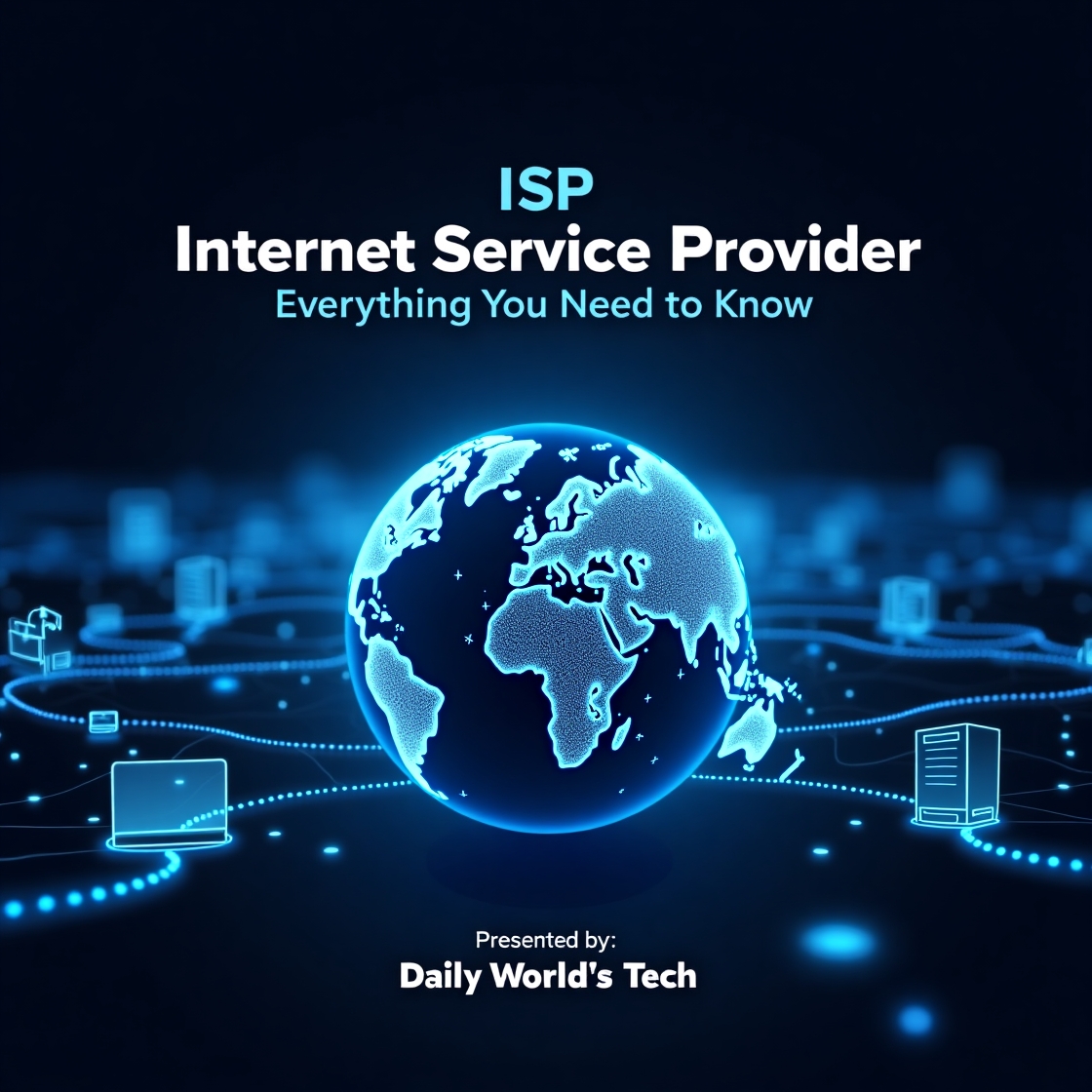In contemporary digital society, the internet is becoming a basic need just like electricity or water. Whether you are streaming videos, doing virtual meetings, operating a business or just surfing social media, none of these would be possible without an Internet Service Provider (ISP). However, just what is an ISP? What is the mechanism? Which ones are there, and how do you select the most appropriate one? This blog will talk about all you need to know about ISPs including the basics to the advanced knowledge.
What is an Internet Service Provider (ISP)?
Internet Service Provider (ISP) is an organization or company which offers people, businesses and other organizations access to the internet. The technologies employed by ISPs in the delivery of connectivity are DSL, cable, fiber optics, satellite, and wireless networks.
Placed in simple terms, an ISP is your entry point to the cyberspace. It bridges your devices (computers, phones, smart TVs, etc.) to the big internet using its own network infrastructure.
What Are the ISPs?
ISPs work by buying internet access service in larger providers called Tier 1 networks or backbone provider and selling it to end-users. Here is how it step-by-step works:
- Backbone Connectivity: The backbone of the internet is where large ISPs are connected to the global internet infrastructure through fiber optic cables under land and sea.
- Regional Distribution: The internet signal is directed to regional data centers where it is further distributed by high-speed routers and switches.
- Last-Mile Connection: ISPs provide internet access to the homes and businesses through various mediums such as fiber, DSL, or cable at these centers.
- Customer Access: Users plug in their gadgets to modems or routers that have been supplied by the ISP, which in turn connects them to the internet.

Types of Internet Service Providers
There are several types of ISPs based on the method they use to deliver internet services:
- Dial-up ISPs
- Oldest form of internet access.
- Uses standard telephone lines and modems.
- Extremely slow (up to 56 kbps).
- Practically obsolete in modern usage.
- DSL (Digital Subscriber Line) ISPs
- Also uses telephone lines but offers better speeds (up to 100 Mbps).
- Allows simultaneous voice and internet use.
- Widely available in urban and suburban areas.
- Cable ISPs
- Uses coaxial cables originally designed for TV.
- Offers higher speeds (up to 1 Gbps).
- Shared bandwidth may cause slowdowns during peak hours.
- Fiber-optic ISPs
- Uses light signals through fiber-optic cables.
- Fastest speeds (up to 10 Gbps or more).
- Highly reliable but limited to areas with fiber infrastructure.
- Satellite ISPs
- Delivers internet via satellites orbiting Earth.
- Available almost anywhere.
- Slower speeds and higher latency; affected by weather conditions.
- Wireless ISPs (WISPs)
- Transmits data using radio signals.
- Useful in rural and remote areas.
- Requires line-of-sight for best performance.
- Mobile ISPs
- Offers internet via cellular networks (3G, 4G, 5G).
- Can be used through mobile hotspots, USB dongles, or smartphones.
- Great for on-the-go access.
Services Provided by ISPs
Modern ISPs do more than just offer internet access. Here are some additional services:
- Email Hosting
- Web Hosting
- Domain Registration
- Virtual Private Networks (VPNs)
- Television Services (IPTV or Cable TV)
- Voice over IP (VoIP) Phone Services
- Cybersecurity and Firewalls
- Cloud Storage and Backup Solutions

How to Choose the Right ISP
Choosing the right ISP is crucial for a seamless internet experience. Consider the following factors:
- Availability
- Not all ISPs are available in every location. Start by checking which providers serve your area.
- Speed
- Choose a plan that matches your needs. For basic browsing, 10–25 Mbps may suffice. For gaming or streaming in 4K, aim for 100+ Mbps.
- Reliability
- Look for ISPs with high uptime and low maintenance interruptions. Fiber ISPs usually offer the best reliability.
- Cost
- Compare prices, including installation fees, modem/router rentals, and monthly bills. Watch out for hidden fees and promotional pricing traps.
- Customer Support
- Read reviews or ask around to assess the provider’s customer service quality.
- Contract Terms
- Some ISPs require long-term contracts or charge cancellation fees. Others offer flexible, no-contract options.
Popular Internet Service Providers Worldwide
United States:
- Comcast Xfinity
- AT&T Internet
- Verizon Fios
- Spectrum
- Cox Communications
United Kingdom:
- BT (British Telecom)
- Virgin Media
- Sky Broadband
- TalkTalk
Pakistan:
- PTCL (Pakistan Telecommunication Company Limited)
- Nayatel
- StormFiber
- Transworld
- FiberLink
India:
- JioFiber
- Airtel Xstream Fiber
- ACT Fibernet
- BSNL Broadband
Each provider has its strengths, and your choice should depend on regional coverage and your personal or business needs.
Role of ISPs in Internet Security
ISPs play a vital role in ensuring secure internet access. Here’s how:
- Firewalls & Filtering: Many ISPs offer built-in firewalls or parental controls.
- DDoS Protection: Businesses can opt for DDoS protection to keep their online presence secure.
- IP Address Management: ISPs assign dynamic or static IP addresses, which influence privacy and tracking.
- Monitoring & Logs: ISPs can log user activity (in some countries) and may comply with government surveillance laws.
If privacy is a concern, consider using a VPN to encrypt your internet traffic.

ISP and Net Neutrality
Net Neutrality is the principle that ISPs should treat all internet data equally, without favoring or blocking particular products or websites.
Controversies have arisen over ISPs:
- Slowing down competitors’ content.
- Charging extra for high-speed access to specific sites.
- Blocking or limiting access to certain services.
Some countries enforce strict net neutrality laws (like the EU and India), while others (like the U.S.) have seen fluctuating regulations.
The Future of ISPs
The landscape of ISPs is rapidly evolving due to several technological advancements:
- 5G and Beyond
- Mobile ISPs are moving toward ultra-fast 5G technology, which may eventually rival home broadband speeds.
- Low Earth Orbit (LEO) Satellites
- Projects like Starlink (by SpaceX) aim to provide global internet access via thousands of low-orbit satellites.
- AI and Smart Routing
- Some ISPs are implementing AI for optimizing network traffic and predicting outages before they happen.
- Green ISPs
- With climate concerns rising, eco-friendly ISPs that use renewable energy and promote digital sustainability are gaining popularity.
ISP Challenges
ISPs also face a range of challenges, including:
- Infrastructure Costs: Laying fiber or satellite infrastructure is expensive.
- Regulatory Compliance: Different countries have varying telecom regulations.
- Competition: In urban areas, fierce competition can lead to price wars and quality issues.
- Data Privacy: Balancing government requirements with user privacy is a constant struggle.
Conclusion
An Internet Service Provider (ISP) is much more than a company that “provides you with Wi-Fi.” It’s an essential component to our online existence, allowing communication and business, entertainment and education. Learning about the way ISPs operate, their types, the process of selecting the one, and the prospects may assist you in making successful decisions and enjoying your time online.
With the advent of a more connected world the role of ISP will only increase and influence not only the way we access the internet – but the way we live work and interrelate. Read more information about Internet Service Provider…















